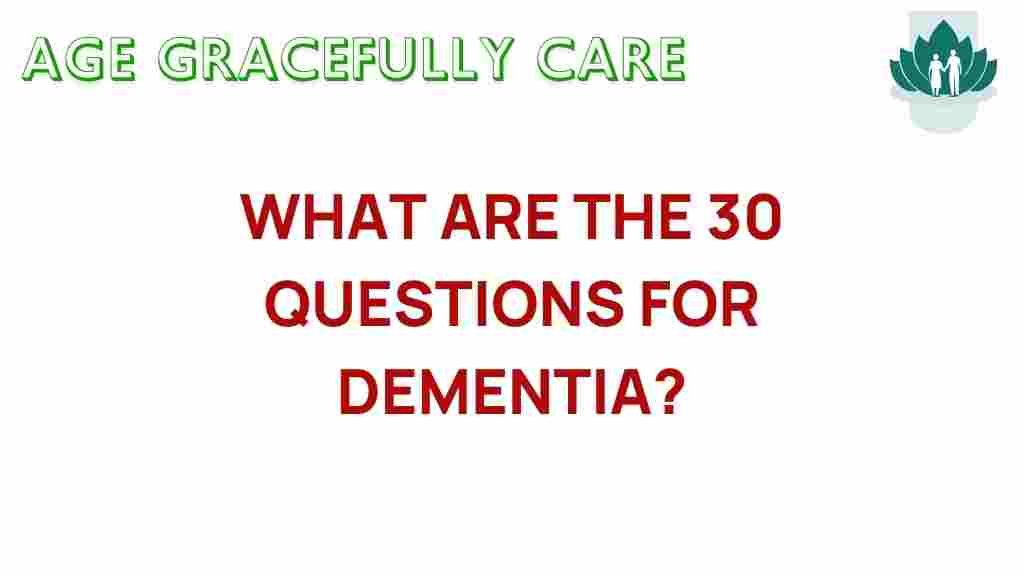Unraveling the Mystery: 30 Essential Questions for Dementia Care
Dementia is a complex condition that affects millions of individuals and their families worldwide. As the population ages, the incidence of memory loss and related disorders, such as Alzheimer’s, continues to rise. Caregiving for individuals with dementia requires not only understanding the disease but also empathy and effective communication. In this article, we will explore 30 essential questions to guide caregivers in providing the best possible patient care for those facing dementia.
Understanding Dementia and Its Impact on Patients and Families
Dementia encompasses a range of symptoms associated with a decline in memory, reasoning, and social abilities severe enough to interfere with daily life. It’s essential for caregivers to have a solid grasp of the implications of dementia on both the patient and family members. Here are some crucial questions that can help elucidate the nature of dementia:
- 1. What are the different types of dementia?
- 2. How is dementia diagnosed?
- 3. What are the common symptoms of Alzheimer’s disease?
- 4. How does dementia progress over time?
- 5. What are the risk factors associated with developing dementia?
Caregiving Essentials: Key Considerations
Effective caregiving for dementia patients requires specific strategies to manage daily activities and enhance the quality of life for both the patient and the caregiver. Here are additional questions to consider:
- 6. What are the best communication strategies for interacting with someone with dementia?
- 7. How can I create a safe home environment for a dementia patient?
- 8. What daily routines can help manage memory loss?
- 9. How can I encourage independence in a dementia patient?
- 10. What types of activities are beneficial for dementia patients?
Health Management for Dementia Patients
Managing the health of a loved one with dementia involves understanding their medical needs and potential complications. Here are some health-focused questions that caregivers should consider:
- 11. What medications are commonly prescribed for dementia, and what are their side effects?
- 12. How can I monitor changes in the patient’s health effectively?
- 13. What nutritional considerations should I keep in mind?
- 14. How can I manage behavioral changes in dementia patients?
- 15. What resources are available for medical support and information?
Support for Caregivers
Caregiving can be a demanding role, and it’s crucial for caregivers to seek support for their mental and emotional well-being. Here are some essential questions regarding support systems:
- 16. What local and online support groups are available for caregivers?
- 17. How can I identify signs of caregiver burnout?
- 18. What respite care options are available to take breaks from caregiving?
- 19. How can family members contribute to caregiving duties?
- 20. What counseling services can help me cope with caregiving stress?
Engaging Family in Dementia Care
Involving family in the caregiving process is vital for a holistic approach to dementia care. Here are some questions that can facilitate family engagement:
- 21. How can I effectively communicate with family members about the patient’s condition?
- 22. What role does family play in the care plan?
- 23. How can we plan family activities that include the dementia patient?
- 24. What strategies can I use to manage family disagreements regarding care?
- 25. How can we ensure the patient feels included in family events?
End-of-Life Considerations and Planning
Planning for the future is a crucial aspect of dementia caregiving. Here are some important questions to address end-of-life considerations:
- 26. What legal documents should be prepared for individuals with dementia?
- 27. How can I discuss end-of-life wishes with the patient?
- 28. What palliative care options are available for dementia patients?
- 29. How can I ensure the patient’s dignity is maintained at the end of life?
- 30. What grief support resources are available for family members after the patient’s passing?
Conclusion
Caring for someone with dementia is a journey filled with challenges, but it can also be a profoundly rewarding experience. By asking these essential questions, caregivers can better navigate the complexities of dementia, provide effective patient care, and ensure that both the patient and family receive the necessary support. Remember, you are not alone in this journey. There are many resources available, including local support groups and professional counseling services, that can help you every step of the way.
For more information about caregiving and support resources, visit this helpful resource. If you are looking for community support, check out this external link for local options.
As you embark on this journey, remember that understanding, patience, and love are your greatest tools in providing care for those dealing with dementia and memory loss.
This article is in the category Care and created by AgeGracefullyCare Team
